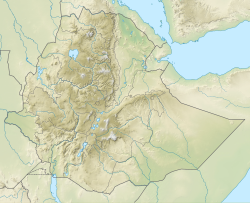| Messebo Cement Factory | |
|---|---|
 | |
 | |
| Built | February 1997 |
| Operated | December 1999 |
| Location | Mekelle, Tigray Region, Ethiopia |
| Coordinates | 13°53′38″N39°31′41″E / 13.894°N 39.528°E |
| Industry | Cement |
| Products | Portland cement |
| Employees | 500 |
| Volume | over 2 million tones |
| Website | Official website |
Messebo Cement Factory is an Ethiopian cement factory based in Mekelle, Tigray Region. It was established in 1997 and is the subsidiary of the Endowment Fund for the Rehabilitation of Tigray (EFFORT).
Contents
It is best known of producing Portland cement with annual production of 900,000 tonnes. [1]
